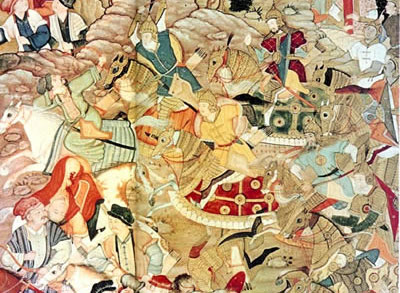
Illustration from History of the Moghuls, a 17th-century Indian text (detail), Gulestan Palace Library, Tehran
The first question about the Mongol conquests is: Why did the Mongols erupt from Mongolia in the early 13th century to begin their conquests of the rest of the world, creating the largest contiguous land empire in world history? There has been considerable speculation about the reasons for the Mongol eruption from Mongolia, and though there is no scholarly consensus on specific reasons, many have pointed to the causes of ecology, trade disruptions, and the figure of Chinggis (Genghis) Khan.
In the period from 1180-1220, Mongolia experienced a drop in the mean annual temperature, which meant that the growing season for grass was cut short. Less grass meant a real danger to the Mongols' animals, and, since the animals were truly the basis of the Mongols' pastoral-nomadic life, this ecological threat may have prompted them to move out of Mongolia. [Also see The Mongols' Pastoral-Nomadic Life].
A second reason often mentioned is the attempt by Mongolia's neighbors in north and northwest China to reduce the amount of trade with the Mongols. Since the Mongols depended on trade for goods that they desperately needed — such as grain, craft, and manufactured articles — cessation of trade, or at least the diminution of trade, could have been catastrophic for them. The attempts by the Jin dynasty, which controlled North China, and the Xia dynasty, which controlled Northwest China, to reduce the level of trade that the Mongols could expect, created a crisis for the Mongols. Unable to obtain goods that they so desperately needed, the Mongols' response was to initiate raids, attacks, and finally invasions against these two dynasties.
A third explanation has to do with Chinggis Khan himself, in particular his shamanic beliefs. It is said that Tenggeri, the sky god of the Mongols, gave Chinggis the mission of bringing the rest of the world under one sword — that is, bringing the rest of the world under the shamanic umbrella — a mission that may have motivated Chinggis to begin his conquests. Whatever the explanations, they all gravitate around the figure of Chinggis himself. Thus it is important to see what Chinggis' policies led to and to analyze his life and career.